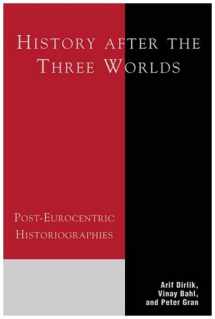
History After the Three Worlds
ISBN-13:
9780847693412
ISBN-10:
0847693414
Edition:
2
Author:
Arif Dirlik, Peter Gran, Vinay Bahl
Publication date:
2000
Publisher:
Rowman & Littlefield Publishers
Format:
Hardcover
320 pages
FREE US shipping
Book details
ISBN-13:
9780847693412
ISBN-10:
0847693414
Edition:
2
Author:
Arif Dirlik, Peter Gran, Vinay Bahl
Publication date:
2000
Publisher:
Rowman & Littlefield Publishers
Format:
Hardcover
320 pages
Summary
History After the Three Worlds (ISBN-13: 9780847693412 and ISBN-10: 0847693414), written by authors
Arif Dirlik, Peter Gran, Vinay Bahl, was published by Rowman & Littlefield Publishers in 2000.
With an overall rating of 3.5 stars, it's a notable title among other
books. You can easily purchase or rent History After the Three Worlds (Hardcover) from BooksRun,
along with many other new and used
books
and textbooks.
And, if you're looking to sell your copy, our current buyback offer is $0.37.
Description
History as a discipline faces a crisis of identity as Eurocentrism fades in a world where globalized visions compete to explain historical processes. Facing the challenge squarely, this volume―comprising specialists on Asia, Africa, and Latin America―explores the state of historical analysis in various world regions and appraises current views on what defines and challenges historical knowledge. It is widely accepted that Eurocentrism no longer seem acceptable in a world where others are reasserting their own notions of past and future. The post–World War II spatialities that guided both historical analysis and the division of labor in historical work are in the process of disappearing into more globalized visions. Constituencies left out of history in the past are making demands for the recognition of their historical presence. History as epistemology is under attack as a marker of Eurocentric modernity from non-historical ways of thinking, as well as from ideologies of postmodernism that deny to history its claims to truth. Indeed, the current situation in the field has been described by one distinguished historian as a “cacophonous confusion.” The challenge historians face is how to imagine new ways of writing history that overcome this confusion without falling back upon ideological and methodological prejudices that reproduce the problems of the past in new guises. The contributors discuss how these challenges are voiced and met in their different areas of specialization. Unsurprising in a volume that addresses a variety of regions and issues that are not only technically historiographical but also deeply cultural and political, the authors differ in their appraisal of the challenges presented by globalization, postmodernism, or postcolonialism. Yet they are united in their recognition of the validity of historical ways of knowing and their reaffirmation of the importance of history in grasping contemporary cultural and political problems. It is because history is entangled in a Eurocentric modernity


We would LOVE it if you could help us and other readers by reviewing the book
Book review

Congratulations! We have received your book review.
{user}
{createdAt}
by {truncated_author}


